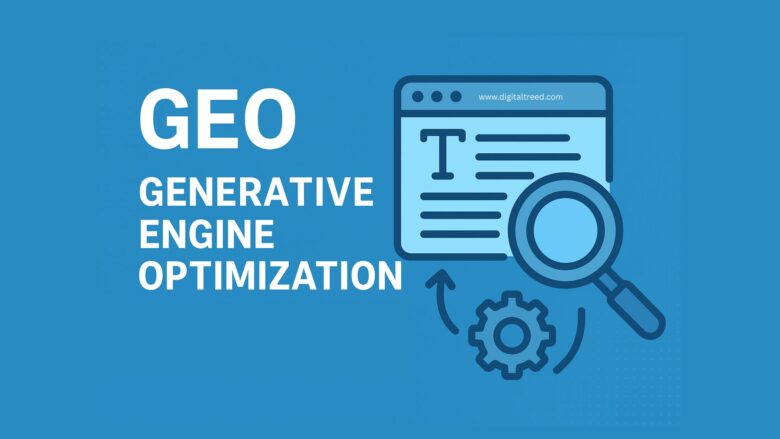Generative enginesare advanced artificial intelligence (AI) systems thatgenerate new digital content—such as text, images, videos, music, or even code—based on existing data and user prompts. They do not just show links, but describe, emphasize, and innovate.
Generative engines do not search in the classical sense. Rather, they synthesize. For example, when you ask; what is the best laptop to use as a digital creator, you do not get a list of websites to visit, but an entire, AI-generated answer, and the answer can use a host of sources without naming them directly.
That is radical and frightening. It is like changing the rules for digital marketers and brands who have been on the SEO ladder over years. It is not about being at the top of Google but being known and cited by the models that drive generative engines. That is, we are moving into the age of Generative Engine Optimization, or GEO.
What Is Generative Engine Optimization (GEO)?
GEO concerns context, credibility, and semantic relationships, whereas SEO concerns keywords, backlinks, and metadata. Generative engines depend on the huge language models that have been trained on text oceans, i.e. they consider authority, structure, and clarity to be much more valuable than keywords density.
Now brands must not only consider ranking- but being understood. That is to produce content that AI can deduce as expert, impartial, and credible. This new ecosystem will not accept a technically optimized blog that is shallow or shallow originality.
The Shifting Character of Online Visibility.
Online presence was synonymous with being on the first page. We have now entered the realm of being the source generative engines prefer to be the representation of the truth. That is a tougher standard–and one that requires both technical accuracy and human genuineness.
You have to satisfy not just algorithms but also the AI they are trained on. The most rapidly adapting businesses are the ones that are accommodating structured data, natural language content, and cross-platform consistency. They are committing to AI-friendly formatting: headings, contextual links, and evidence-based and updated information.
The reason GEO is important to contemporary digital brands.
That is the truth of it: generative engines are already affecting purchasing choices, brand recognition, and consumer trust–silently, invisibly, and perpetually. Ask AI what the best CRM tools are or what the safest electric cars are, and you will be market-making in real time.
Those brands that recognize this dynamic can establish themselves as trusted data points in the AI ecosystem. The ones that fail to do so will be forgotten in the digital shadows.
The challenge is already being pivoted by forward-thinking digital agencies. Organisations such as DBWD, one of the most wise UK GEO agencies and a leader in digital innovation are assisting businesses get used to this new reality, combining traditional SEO knowledge with the latest AI insight to ensure that businesses remain findable in the era of generative intelligence.
The Generative Gatekeeping Ethics and Opportunity.
Of course, ethically, there is a layer to all this. Generative engines are not merely sieving information, but making sense of it. This provides them with extraordinary influence over popular opinion. What a model knows about your brand may be informed with how that model has learned through your content, conversations of your audience, and even your competitors.
To marketers, that is both a challenge and opportunity. It implies that brand reputation has to be taken care of not only on behalf of human beings, but on behalf of machines. The
narrative that your brand tells on the Internet must work on two scales: emotionally close to your viewers, and contextually close to AI.
The New Digital Reality.
So, what’s next?
Companies must begin to consider their content as learning data. Each blog, social post, and press release helps the generative AI model see them. GEO is concerned with forming that digital fingerprint—uniquely created, consistently, and believably enough that AI systems can identify and recreate it.
In this regard, the internet is undergoing a second renaissance: the one in which brands need to address people and the algorithms that filter their appearances.
New gatekeepers could be generative engines, but they do not close doors: they only open new entry points to the brands that are courageous enough to change. The individuals who accept this change will not merely survive the algorithmic revolution; they will actually define the next wave of online discovery in its own right.

I like the efforts you have put in this, regards for all the great content.
This post demonstrates power of authentic storytelling to create real change
I just like the helpful information you provide in your articles
Your writing is a true testament to your expertise and dedication to your craft. I’m continually impressed by the depth of your knowledge and the clarity of your explanations. Keep up the phenomenal work!
I like the efforts you have put in this, regards for all the great content.
Your blog is a treasure trove of knowledge! I’m constantly amazed by the depth of your insights and the clarity of your writing. Keep up the phenomenal work!
Insightful post — I’d be interested in a follow-up on advanced topics.
I appreciate the real-world examples you included — they made the concept click.
There is certainly a great deal to learn about
this issue. I love all of the points you have made.